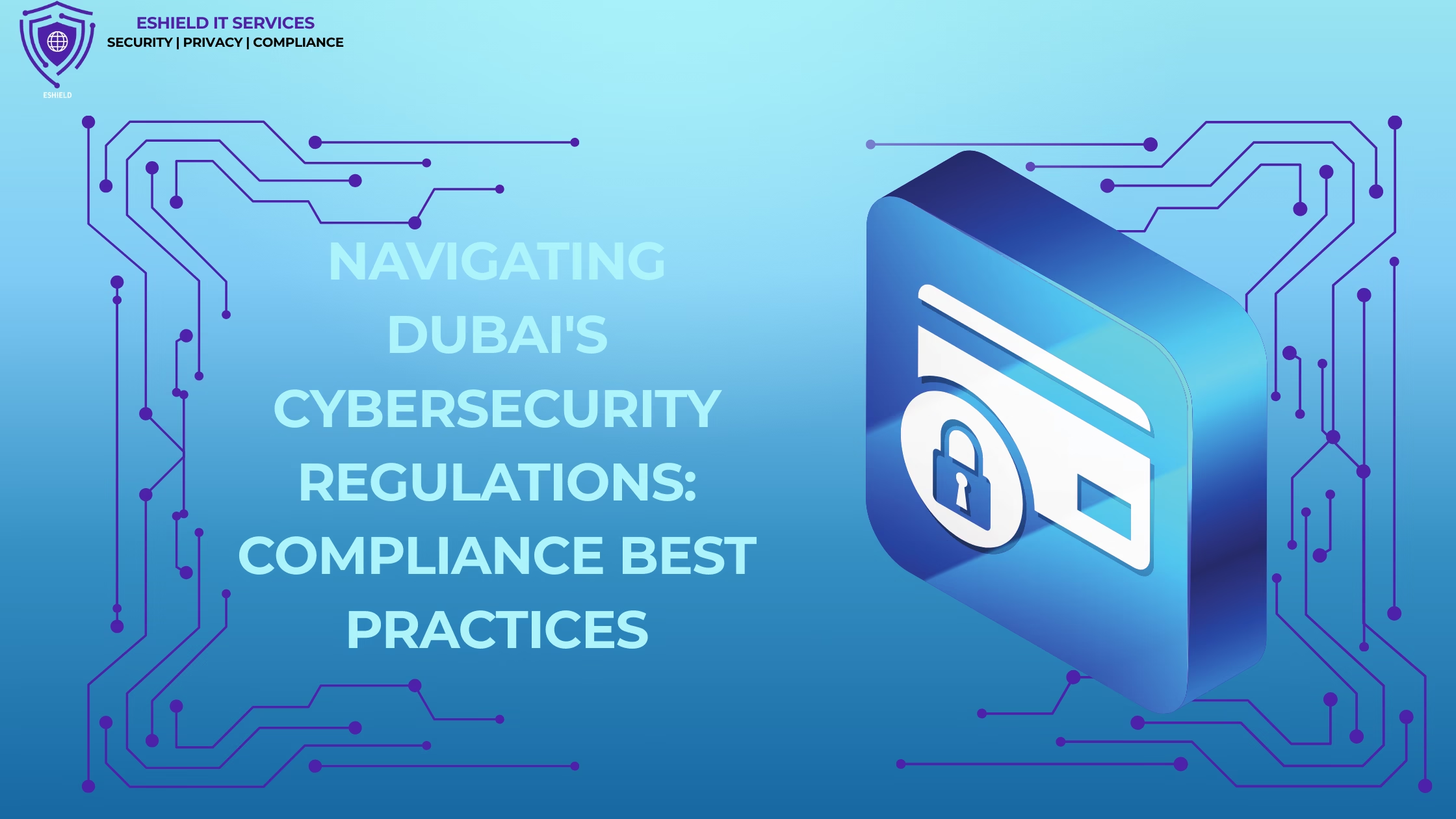Are you sure your business is safe from digital threats?
In today’s world, strong cybersecurity is a must, not a choice. Businesses in the United Arab Emirates are going digital fast. They must follow strict compliance requirements to keep their data safe and operations running smoothly.
Eshielditservices can guide businesses through the complex world of cybersecurity regulations. They help protect your business’s valuable assets.
Key Takeaways
- Understanding the importance of cybersecurity regulations in protecting businesses.
- Overview of compliance requirements for businesses in the UAE.
- The role of Eshielditservices in helping businesses navigate cybersecurity regulations.
- Effective measures to protect business assets in the digital age.
- Best practices for maintaining operational integrity.
The Evolving Landscape of Digital Threats
UAE businesses are facing new challenges with digital transformation. They must deal with advanced cyber-attacks that test their data protection. It’s key for UAE businesses to understand the current cybersecurity landscape.
Current Cybersecurity Challenges for UAE Businesses
UAE businesses face many cybersecurity challenges. These include advanced persistent threats (APTs), zero-day exploits, and ransomware attacks. These threats are getting more complex. It’s vital for businesses to have strong information security standards to protect their networks and data.
The data protection laws in the UAE require businesses to be proactive in protecting sensitive information.

The Financial and Reputational Impact of Security Breaches
A security breach can have severe effects. It can lead to big financial losses and damage a company’s reputation. Businesses might face fines for non-compliance with data protection rules.
They also have to pay for incident response and fixing the breach. A breach can also hurt customer trust. This could lead to losing business and revenue. So, investing in strong cybersecurity is not just a rule, but a must for businesses.
Navigating Cybersecurity Regulations for Business Protection
UAE businesses must follow cybersecurity rules to fight digital threats. The rules mix local and international laws, making it complex.
UAE Federal Law No. 5 of 2012 on Combating Cybercrimes
The UAE made UAE Federal Law No. 5 of 2012 on Combating Cybercrimes to fight cyber threats. It makes hacking, identity theft, and fraud online crimes. Companies need strong security to follow this law and avoid fines.
UAE Information Assurance Standards and NESA Requirements
The UAE Information Assurance Standards and NESA rules are key for companies with sensitive info. These rules help keep information safe.
International Regulations Affecting UAE Companies
UAE companies with global ties must follow worldwide cybersecurity rules. Two big rules are:
GDPR Compliance for UAE Businesses with European Connections
UAE companies in or with the European Union must follow GDPR. GDPR protects EU citizens’ data, requires data protection, and breach reporting.
PCI DSS Requirements for Payment Processing
Companies handling payment card info must follow PCI DSS. PCI DSS keeps cardholder data safe during processing, storage, and transmission.
By following these rules, UAE companies can fight cyber threats and keep customer trust. Eshielditservices can help businesses understand and meet these complex rules.
Step-by-Step Compliance Assessment Process
UAE businesses face a complex world of cybersecurity rules. A detailed compliance assessment process is key. It includes several important steps to ensure they meet all the rules.
Conducting a Regulatory Gap Analysis
A thorough regulatory gap analysis is the first step. It finds the rules your business must follow, like PCI DSS for payment card security or SOX for financial reporting. By checking your current security against these rules, you spot what needs work.
- Review current security policies and procedures
- Assess technical controls, such as firewalls and encryption
- Evaluate administrative controls, including training and incident response plans
Identifying Industry-Specific Requirements
Each industry has its own set of rules. For instance, healthcare must follow HIPAA, while finance must meet PCI DSS and more. Knowing these rules is vital for a good compliance plan.
Creating a Risk-Based Compliance Roadmap
After finding the rules and security gaps, you can make a compliance plan. This plan focuses on fixing the most risky gaps first. It makes your compliance work both smart and quick.
- Prioritize remediation efforts based on risk level
- Develop a timeline for implementing corrective actions
- Assign responsibilities to team members for each task
By following this process, UAE businesses can meet all the rules and keep their digital world safe. Eshielditservices can help guide you through these steps, making it easier to handle cybersecurity rules.
Implementing an Effective Cybersecurity Framework
For businesses in the UAE, having a strong cybersecurity framework is key. It protects against digital threats and follows local and international rules. A good framework keeps data safe and meets legal standards.
Adapting the NIST Cybersecurity Framework for UAE Requirements
The NIST Cybersecurity Framework is a detailed guide for managing cybersecurity risks. To fit UAE businesses, they need to look at local laws and specific needs. This means:
- Identifying key infrastructure and assets
- Assessing risks and threats
- Putting in place protective measures
- Creating detection and response plans
- Setting up recovery plans
Developing Policies and Procedures for Regulatory Alignment
UAE businesses must create policies and procedures that follow local laws. This includes UAE Federal Law No. 5 of 2012 on Combating Cybercrimes. They need to:
- Set clear roles and responsibilities
- Define incident response plans
- Use data protection and privacy measures
- Do regular security audits and risk assessments
Eshielditservices can help make these policies and procedures. They ensure they meet all the necessary rules.
Employee Training and Security Awareness Programs
Training and security awareness programs are vital for a good cybersecurity framework. Teaching employees about cybersecurity and new threats helps prevent security breaches. Eshielditservices provides custom training to improve employee awareness and response to cyber threats.
How Eshielditservices Helps Businesses Meet Compliance Requirements
Eshielditservices helps UAE businesses fight cyber threats. They offer expert advice to boost cybersecurity and follow data protection laws. In today’s world, keeping up with these laws is key for UAE businesses.
Eshielditservices has a wide range of services to help businesses deal with complex rules. They help companies meet compliance requirements. This way, businesses can protect their data and keep their customers’ trust.
Comprehensive Compliance Assessment and Advisory Services
Eshielditservices starts by checking a company’s cybersecurity. They look at current security measures against data protection laws like UAE Federal Law No. 5 of 2012. This law fights cybercrimes.
They then give businesses a plan to follow. This plan includes tips for better security and best practices.
Managed Security Solutions for Regulatory Compliance
Eshielditservices also offers managed security solutions. These are made for each business’s needs. They use the latest security tech to fight cyber threats.
By letting Eshielditservices handle security, businesses get expert help. This keeps them in line with rules.
Continuous Monitoring and Compliance Reporting Tools
Eshielditservices also has tools for constant monitoring and reporting. These tools help businesses stay on top of threats. They also keep an eye on security.
These tools make it easy to report and analyze security. This shows businesses follow data protection laws. It’s good for stakeholders and regulators.
| Service | Description | Benefit |
|---|---|---|
| Compliance Assessment | Thorough evaluation of cybersecurity posture | Identifies areas for improvement |
| Managed Security Solutions | Implementation of advanced security technologies | Enhanced security and compliance |
| Continuous Monitoring | Ongoing monitoring and reporting | Maintains compliance and security visibility |
Conclusion: Sustaining Compliance in an Evolving Regulatory Landscape
In today’s digital world, keeping businesses safe is key. Eshielditservices guides companies through these rules. They help put in place strong cybersecurity steps to keep up with changes.
Following security standards and rules helps UAE businesses fight off cyber attacks. Eshielditservices offers detailed checks and advice, security management, and tools for constant monitoring and reporting.
It’s vital to stay one step ahead of new threats and rule updates. With Eshielditservices, companies can keep their security strong. This protects their good name and valuable assets in the fast-changing digital world.
FAQ
What are the key cybersecurity regulations that UAE businesses must comply with?
UAE businesses must follow laws like UAE Federal Law No. 5 of 2012 on Combating Cybercrimes. They also need to follow UAE Information Assurance Standards and NESA Requirements. Businesses with global ties must also meet GDPR, PCI DSS, HIPAA, SOX, and NIST Cybersecurity Framework rules.
How can businesses ensure compliance with cybersecurity regulations?
Businesses should first do a detailed regulatory gap analysis. Then, they need to find out what rules apply to them. They should make a plan based on their risks and use a strong cybersecurity framework like NIST.It’s also important to train employees on cybersecurity. This helps everyone understand the importance of following these rules.
What is the importance of GDPR compliance for UAE businesses?
UAE businesses with ties to Europe must follow GDPR to protect EU citizens’ data. Not following GDPR can lead to big fines and harm to their reputation.
How can Eshielditservices help businesses meet cybersecurity compliance requirements?
Eshielditservices offers detailed compliance checks and advice. They also provide managed security services and tools for ongoing monitoring and reporting. This helps businesses stay in line with cybersecurity rules.
What is the NIST Cybersecurity Framework, and how can it be adapted for UAE businesses?
The NIST Cybersecurity Framework is a well-liked guide for managing cybersecurity risks. UAE businesses can tailor it to fit their needs. They can do this by figuring out what’s most important to them, checking their risks, and taking steps to lower those risks.
Why is employee training and security awareness important for cybersecurity compliance?
Training and awareness programs are key to stopping cyber-attacks and data breaches. When employees know what to look for, they can spot and report threats. This helps keep the business safe.
How can businesses stay up-to-date with evolving cybersecurity regulations and compliance requirements?
Businesses can keep up with new rules by working with cybersecurity experts like Eshielditservices. They should also go to industry events and take part in training programs.


